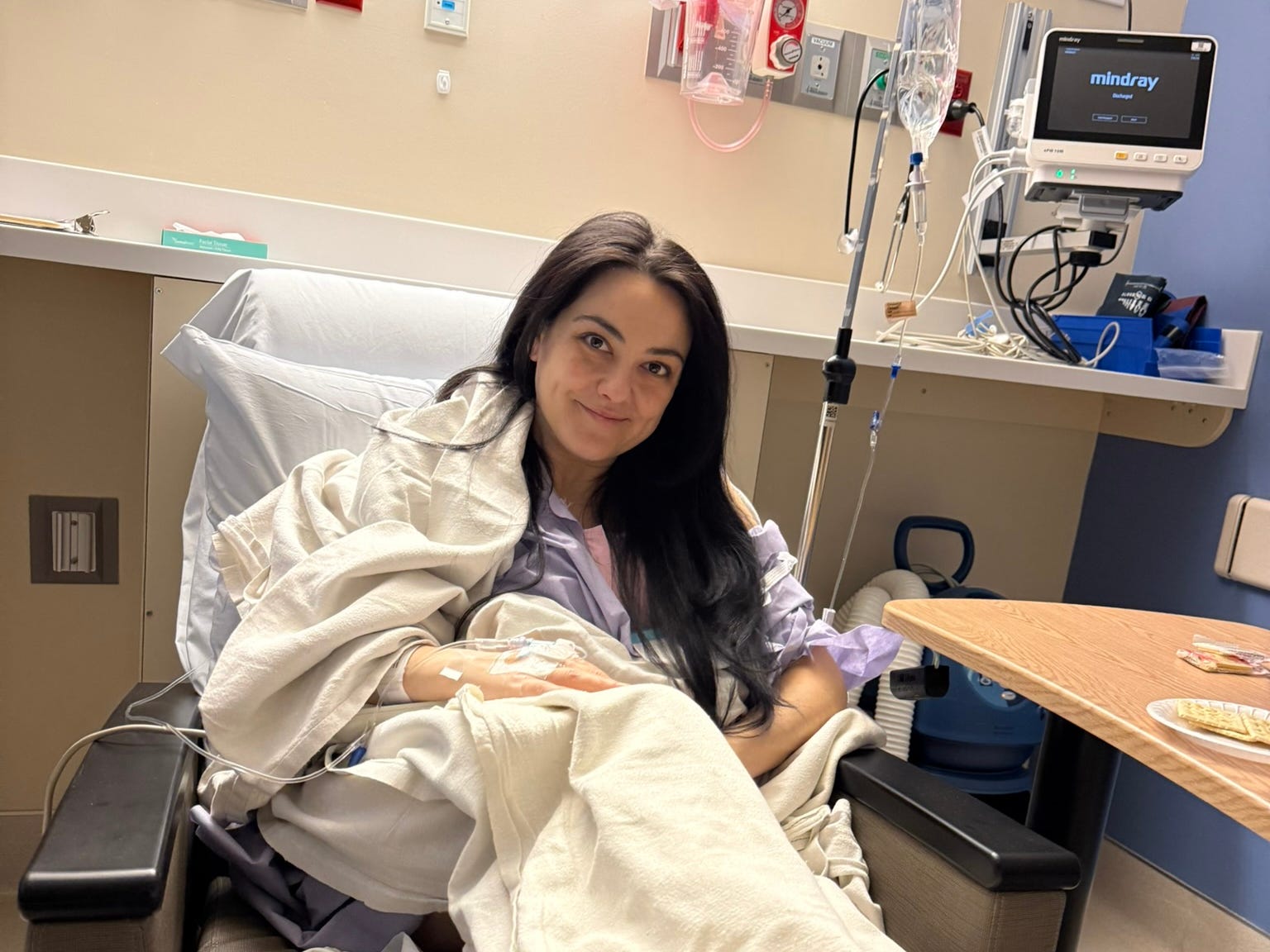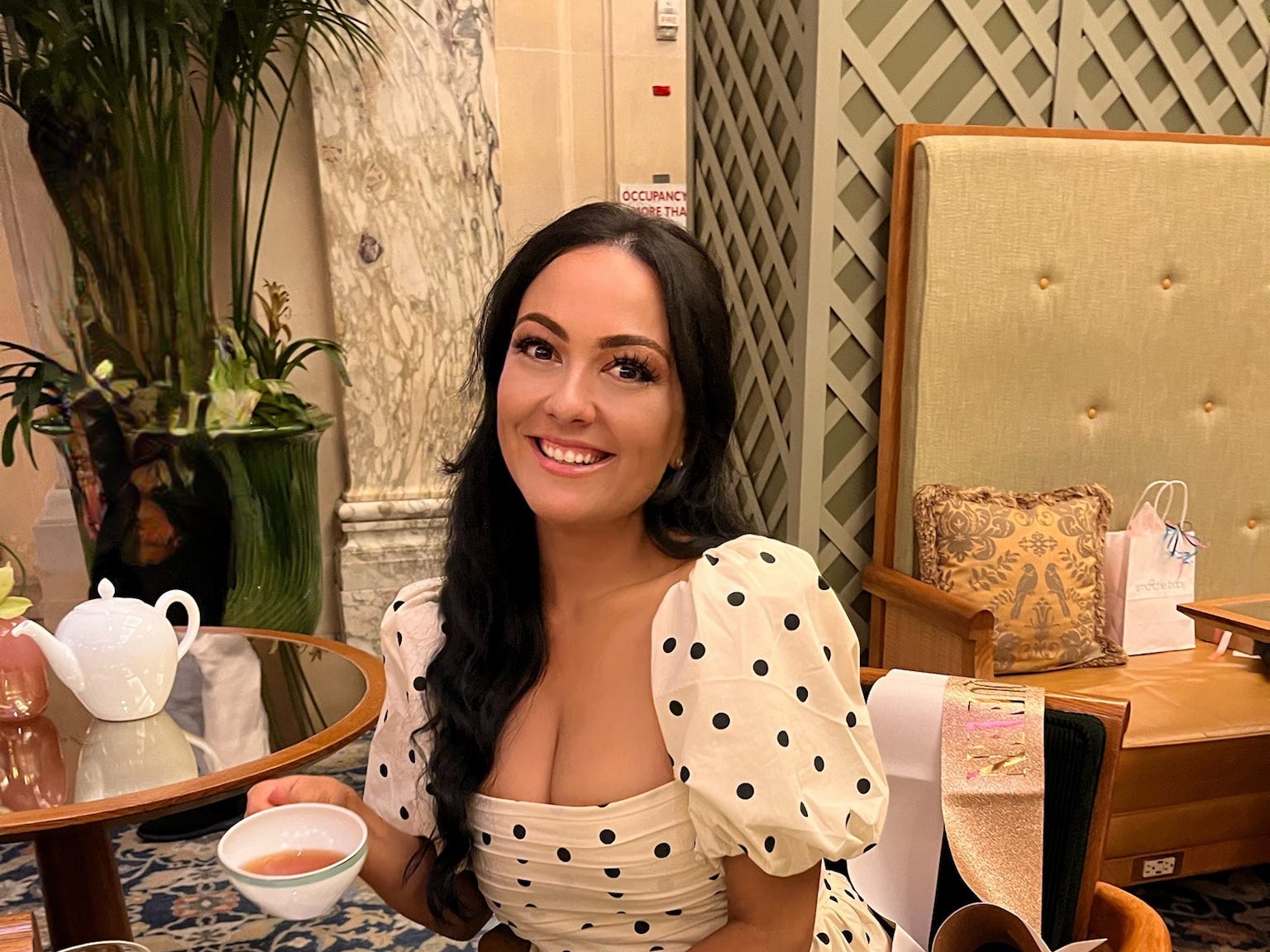
Courtesy of Rachel LaBella
When I turned 30, it felt like I was stepping into a new chapter. My partner and I had spent most of our 20s together and were finally in a place where planning for the future felt tangible.
After a few difficult years, including the sudden loss of my father and several career missteps, I found myself longing for something joyful and grounding. I wanted purpose, direction, and maybe even a little stability. For the first time, I began picturing myself as a mom.
Then I was diagnosed with breast cancer.
I was shocked when I got my diagnosis
I was diagnosed by accident.
I had gone years without seeing a gynecologist. During a routine check-up, I casually mentioned this to my primary care physician, who offered to do a quick breast exam “just in case.” That’s when she felt a lump.
I mentioned that I’d recently been laid off and was in between jobs, without insurance. She told me to reach out once I had coverage and she’d write a prescription for a mammogram. On the drive home, I felt a quiet but urgent instinct not to wait. As soon as I got home, I called her back and asked for the prescription.
After a mammogram, ultrasound, and biopsy, I received my diagnosis: stage 1 estrogen receptor-positive, progesterone receptor-positive invasive ductal carcinoma. I couldn’t make sense of what I was hearing.
Nothing about me fit the narrative I’d grown up believing about who gets breast cancer. I have no family history, don’t carry the BRCA gene mutation or any other genetic markers linked to increased risk. What was once seen as a medical anomaly is becoming increasingly common among women my age.
My treatment plan included a partial mastectomy, four weeks of daily radiation treatments, and a daily hormone therapy regimen of Tamoxifen, prescribed for five to 10 years, depending on how my system responds.
Tamoxifen, often prescribed to treat hormone-positive breast cancer, suppresses estrogen and simulates menopause. It comes with a parade of side effects, including hot flashes, weight gain, and unpredictable mood swings.

Courtesy of Rachel LaBella
I learned I can’t get pregnant during my treatment
Then came a very different kind of blow. Pregnancy while on the medication is strongly discouraged due to the risk of serious complications, including birth defects, miscarriage, and stillbirth. Beyond that, the hormonal surge associated with pregnancy before completing treatment could increase the likelihood of a cancer recurrence.
I was scheduled for surgery just one month after my diagnosis. And two weeks before the procedure, my oncologist urged me to freeze my eggs. She explained that pregnancy wouldn’t be advised until I was at least 35 due to the complications that could be caused by Tamoxifen — an age that, however dated or insulting it sounds, qualifies as a “geriatric pregnancy” by medical standards.
I dissociated my way through a blur of hormone injections, blood draws, and invasive procedures that I barely had time to process.
Thankfully, I was spared the financial burden, an immense relief amid the mental, emotional, and physical toll. In 2018, my home state of Connecticut became the first in the nation to require insurance coverage for fertility preservation in cancer patients.
Delaying motherhood isn’t my choice
Though my treatment plan gives me the best chance at survival, it comes at a cost. I’m losing the ability to choose when I want to have kids, and now, I won’t be able to have them before 35 at the earliest — possibly as late as 40.
I resent that, like it or not, I’ll have to be an “old mom” before I ever had the chance to be a “young” one. So far, my partner has been supportive. But I know he always pictured himself becoming a dad sooner rather than later. And when I see him play with our friends’ kids, I feel a pang of guilt I can’t always ignore.
Now we’re stuck in limbo while our friends move forward — throwing baby showers, assembling cribs, and posting first-day-of-school photos. I picture myself at preschool, the silver-haired mom whose knees crack at circle time. And I hate that I care. But I do.
Then, there’s navigating the dissonance between medical necessity and personal expectation. By my 30s, I expected to have it all figured out — career, family, identity. But my timeline was taken from me, redrawn by scans and blood tests, follow-ups, and daily pills.
There’s also no villain here, no one to blame. It’s just a sterile, clinical equation guiding huge decisions about my future.
I don’t know what’s next, but I’m still grateful
I’m grateful to be here. I know many people diagnosed with breast cancer never get to consider family planning at all. But I also want to be honest about the loss, the uncertainty, and the weird in-between space where you’re healthy but still healing, coping but still grieving the version of your life that never got to happen.
I don’t know what comes next. Maybe the family I envisioned is still on the way, just a little later than I thought. This isn’t the path I planned, but it’s the one I’m on. And for now, that has to be enough.
The post I got breast cancer at 30. My treatment means I’ll need to delay having kids for 5 to 10 years. appeared first on Business Insider.




